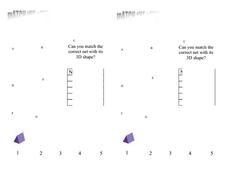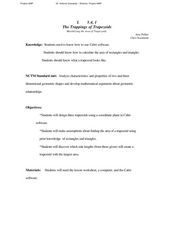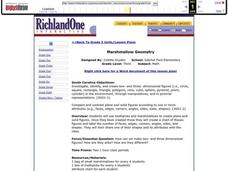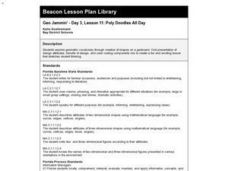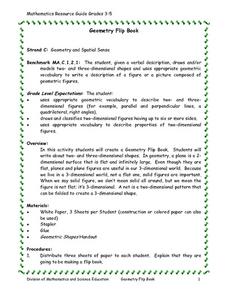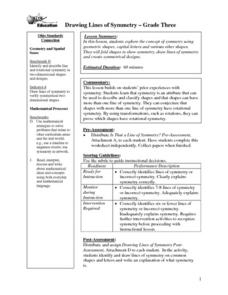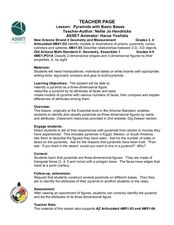Curated OER
Match The Nets
In this math learning exercise, students match the drawings that are in pieces in order to create three dimensional geometric figures. They match the nets with the shapes.
Curated OER
The Trappings of Trapezoids
Students define trapezoids and their shapes. In this geometry lesson, students calculate the area of a trapezoid and a parallelogram. They use Cabri software to make investigations.
Curated OER
Inscribed Quadrilaterals and Parallelograms
Learners differentiate between inscribed quadrilaterals and parallelograms. In this geometry lesson, students identify the shaped of the polygons when it is inscribed inside of a circle. They calculate the missing angles of the inscribed...
Curated OER
Exploring Geometric Mean
Student identify the solution using geometric mean. In this geometry lesson, students create right triangles where the altitude of the triangle is the side containing the right angle. They modify shapes using Cabri software and observe...
Charleston School District
Applications of the Pythagorean Theorem
Use patterns to your advantage! The Pythagorean Theorem allows learners to find missing sides of right triangles. Problems include those with both rational and irrational lengths.
Curated OER
They're Everywhere! They're Everywhere!
Students gain an appreciation of the polygons and polyhedrons around them that make their world one of order and strength. They build polygons and polyhedrons, and then construct airplanes out of polygons.
Youth Education Services
Relating Volume in 3D Objects with Ten Problems
A fabulous four-page assignment explores volume formulae for rectangular prisms, cylinders, cones, and pyramids. Pupils apply the formulas to solve problems, match diagrams to values, and address real-world scenarios. A detailed answer...
Curated OER
What's My Rule for Sorting?
Students view objects sorted by one characteristic and name that characteristic. In this sorting rule lesson, students explore to find a new characteristic and write a description of that rule. In early grades the rule might...
Curated OER
Geo Jammin' - Day 2, Lesson 6: Rhyme and Reason
Students listen to the poem "Shapes" by Shel Silverstein in order to accurately and specifically describe shapes' rules/traits in their journals. They illustrate the poem and take turns reading during a creative shared reading session.
Curated OER
Comparing Measurements
Students explore measurements by completing worksheets in class. For this geometry lesson, students identify the basic measurement units in both the English and metric systems. Students analyze 2 and 3 dimensional objects and identify...
Curated OER
Marshmallow Geometry
Third graders create 2D and 3D shapes using marshmallows and toothpicks. In this geometry lesson plan, 3rd graders create their shapes and document the number of faces, edges, corners, angles, and sides. They share one shape and its...
Curated OER
Geo Jammin' - Day 3, Lesson 11: Poly Doodles All Day
Pupils explore geometric vocabulary through creation of shapes on a geoboard. They present design attributes, transfer of design, and color-coding components mix to create a fun and exciting instructional activity that stretches student...
Curated OER
Geometry Flip Book
Young scholars investigate the concepts of geometry that can be grouped into a flip book that can be used for teaching and review purposes. They define the differences between two and three dimensional figures. Also polygons are reviewed...
Curated OER
Squares to Compare
Students investigate how to draw and classify two and three dimensional figures (squares, triangles, rectangles.)
Curated OER
Investigating Nets and Polyhedra
Fifth graders create a net for a given polyhedron. They determine the corresponding polyhedron for a given net. Students investigate several polyhedra (cube, tetrahedron, and one of their choosing) and their corresponding nets. They...
Curated OER
Tiling the Plane
Fifth graders use pattern blocks and triagular grid paper to reivew shape names, be introduced to the concept of a tiling of the plane, and determine which pattern blocks tile the plane. They are asked if they comprehend what a...
Curated OER
Drawing Lines of Symmetry
Third graders explore the concept of symmetry using geometric shapes, capital letters and various other shapes. They fold shapes to show symmetry, draw lines of symmetry and create symmetrical designs.
Curated OER
Volume, Surface Area for Rectangular & Triangular Prisms
Seventh graders explore the concept of rectangular and triangular prisms. In this rectangular and triangular prism lesson, 7th graders identify various prisms as triangular or rectangular. Students discuss the various shapes of bases...
Curated OER
Pyramids with Basic Bases
Students explore pyramids. In this math lesson, students discuss where they have seen examples of pyramids. Students classify pyramids as three-dimensional figures and identify their attributes.
Curated OER
Translations, Reflections, and Rotations
High schoolers are introduced to the concepts of translation, reflection, and rotation. They practice translating, reflecting, and rotating two-dimensional objects on the coordinate plane. students use computers to learn about the three...
Curated OER
Angles Lesson Plan
Students explore the relationship of angles as it relates to 2 and 3-D shapes. For this geometry lesson, students differentiate between acute, obtuse, right, alternate interior, exterior and adjacent angles. They manipulate a math...
Curated OER
Platonic Solids
Students identify different types of polygons. In this geometry lesson, students differentiate between convex and regular shapes. they identify the names of two and three-dimensional objects.
Curated OER
Who's In The Fact Family?
Learners study related addition and subtraction facts. In this math lesson, students use related addition and subtraction to solve problems. Learners use manipulatives to explore fact families.
Curated OER
Geometry Institute Lesson
Students practice geometry skills. In this geometry lesson, students find the surface area of cubes and prisms, identify shapes on solids, and distinguish between 2-dimensional objects and solids.
